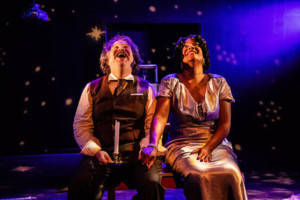Review: THE SECRETS OF THE UNIVERSE (AND OTHER SONGS) at The Hub Theatre

"Secrets of the Universe (And Other Songs)," like its subjects, is incredibly ambitious. Centered on the friendship between renowned physicist Albert Einstein and celebrated singer Marian Anderson, the play opens in 1937 with Anderson's arrival at Einstein's home shortly after returning to the United States following her tour of Europe; Anderson famously stayed with Einstein when she was denied a hotel during her visit to Princeton. The two - along with Anderson's Finnish accompanist, Kosti Vehanen, and Einstein's secretary, Helen Dukas - engage in banter, minor flirtations, and in-depth discussions about music, physics, and their tumultuous world. The play then follows their friendship over the years, through Anderson's famous performance at the Lincoln Monument and their last meeting, just a few months before Einstein's death in 1955.
A friendship between such prominent figures is a fascinating subject, and reimagining their discussions about their shared experiences as well as their own areas of expertise can be grounds for great theatre. Unfortunately, while the concept is wonderful, the Hub Theatre's execution comes up short. The show attempts to portray Einstein's theories of space and time in action, and chooses to do so with odd interludes involving in other figures, including Anderson's grandfather, who escaped from slavery, Jackie Robinson, and the Roosevelts. Unfortunately, the result is confusing, with no clear purpose to these appearances nor clarity on who can actually see or interact with these characters. These interludes often feel shoehorned to try to convey a larger point that the show aspires to, but can't quite reach. There are also allusions to a problem with Anderson's performance at the White House, and hints at a possible affair (or rejection of an affair) with one or both of the Roosevelts, though the latter in particular seems to be purely speculative. Little is done to explain this inclusion or its value to the characters. Furthermore, while Einstein was known for his love of humor, the constant insertion of his jokes (and one drawn-out joke about passing gas) felt more forced than humorous.
There are also a number of tangents in the show that make conversations difficult to follow. Often, when a discussion gets personal or touches on a particular detail (such as Einstein's schizophrenic son), the characters suddenly retract their conversation, informing the audience that they didn't actually say these things. It is unclear how much of the conversation should be believed and how much should be kept as background knowledge. Simply repeating the last line before the tangent, or a lighting shift could easily resolve this, but instead the audience is left questioning. The audience confusion seems so clearly ingrained in this production, though, that one of the actors felt the need to confirm that the show was over after the last fade-out.
This self-consciousness only furthers the sense that this is a show that fails to live up to its potential, which is a shame because there are some wonderful elements. Lolita Marie beautifully embodies Marian Anderson, and Mindy Shaw's Helen Dukas makes the background character rightfully shine. The set is, for the most part, a homey portrayal of a genius' apartment in the 1940s, and the piano makes a wonderful centerpiece for the action. The addition of a rolling toilet, however, felt a bit unnecessary. Act II opened with higher stakes than the first, and touched on important themes that resonate loudly today: Anderson's desire to stay out of politics while acknowledging that her existence was inherently political, Einstein struggling to reconcile his work with its later uses, and questions of choosing activism versus the need to rise to meet demands when silence supports your enemy. Einstein's twilight decision to listen to Beethoven, in an attempt to "listen to what [he does] not want to hear," is powerful and relevant to modern day.
Whether it's worth the trip (the Hub Theatre is located in Fairfax, and is not on a metro line) is up to the individual, but I think the show's refrain sums it up: "Yes, possibly, probably not."
"Secrets of the Universe (And Other Songs)" plays at the Hub Theatre as a co-production with the Jewish Community Center of Northern Virginia. Performances run through July 29th.
Photo Credit: The Hub Theatre
Reader Reviews
Videos

